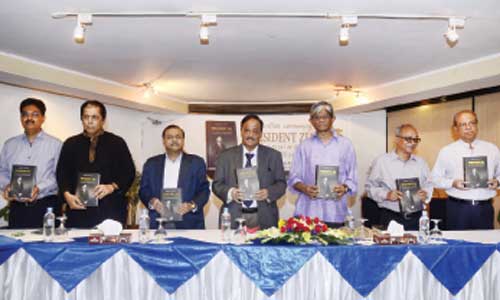Publication ceremony focuses on Zia’s life, work
Discussants on Tuesday focused on different aspects of journalist Mahfuz Ullah’s book ‘President Zia of Bangladesh: A Political Biography.’
At the publication ceremony of the book at BRAC Centre in the capital, they also focused on the life and work of the late president Ziaur Rahman.
Former Bangladesh Bank governor Saleh Uddin Ahmed said that the author rightly depicted that Ziaur Rahman had tried to ensure economic development of the country.
He said that Zia’s canal excavation programme was aimed at natural rural irrigation to enhance the country’s crop production. His two-year rolling plan until 1980 mainly focused on agricultural development while the country’s second five-year plan also focused on the same issue.
Former state minister Abul Hasan Chowdhury termed Zia a ‘great historic personality’ and said, ‘I find that the nation with the greatest Bangalee Bangabandhu Sheikh Mujibur Rahman and the memory of Ziaur Rahman can forge a sort of unity.’
Former ambassador Sirajul Islam said that the book was a well researched work and rightly said that after the 1975 changeover there was a tremendous fear and Zia normalised the situation gradually.
Hearing Zia’s voice on the radio on March 27, 1971, people could know that it was the time to fight, he said, adding that the contribution of the country’s founding president Sheikh Mujibur Rahman was, of course, the highest.
Social scientist and writer Mizanur Rahman Shelley said that Mujib could not complete his work for the reconstruction of the country because of different limitations and the responsibility fell on Zia, who could improve the situation gradually.
Mizanur recalled that Ziaur Rahman replied ‘neither in the negative nor in the positive’ to his question whether he declared the independence of the country on his own.
New Age editor Nurul Kabir said that it was important to have comprehensive studies on the lives of those who had influenced the country’s politics and controlled the state machinery in the past, for that helps to analyze the present and properly plan the future.
Talking about Zia’s political life, Kabir said he was primarily a military leader, while the foremost political act was to announce, on behalf of Sheikh Mujibur Rahman, the independence of Bangladesh on March 27, 1971. While the politicians readied the people for independence, Major Zia’s declaration combined the military element with political aspiration that helped shape in the people’s mind the imagination of an independent state.
As regards exercise of power in the post-1975 scenario, Kabir said that Zia definitely contributed to the political stabilisation of the society, but he ran both the state and his party dictatorially, which still dominate the Bangladesh polity. He also said, instead of supporting Zia’s political initiative, the leftwing forces should have proceed with their politics independently, leaving the former to build up his own centrist political forces.
Mahfuz Ullah said he wrote the 670-page book having 14 chapters and 11 appendixes in four years though it was not a complete political biography Zia.
The event of Ziaur’s March 27, 1971 declaration of independence and the November 7, 1975 uprising, the two great historic events of the country’s politics, deserved two separate books, he said.
Syed Zakir Hussain of Adorn Publication also spoke.
News Courtesy: www.newagebd.net











